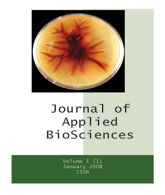Journal of Applied Biosciences (J. Appl. Biosci.) [ISSN 1997 - 5902]
Volume 57: 4194 - 4203. Published September, 2012.
*Silvestro Meseka1*2,
and Jamal Ishaaq1
1Agricultural Research
Corporation, P.O. Box 126, Wad Medani, Sudan
2Current
address: International Institute of Tropical Agriculture, PMB 5320, Oyo Road,
Ibadan, Nigeria
*Corresponding author,
e-mail: s.meseka@cgair.org
RESUME
Objective: A study was conducted to
estimate combining ability among four introduced drought tolerant maize (Zea
mays L.) inbred lines and five local open pollinated varieties (OPVs) in Line
x Tester mating design.
Methodology
and results:
The experiment was arranged in 5 x 5 alpha lattice with three replications
conducted at Gezira Research Station (GRS), Sudan, in 2008 and 2009. Significant
differences were detected among hybrids for all measured traits. Combining ability
analysis showed that non-additive gene effects were important for inheritance
of all traits except ear length which was controlled by additive gene effects.
General combining ability (GCA) had the highest contribution to total variation
of plant height, ear height, and grain yield, whereas specific combining ability
(SCA) had the highest contributions to days to 50% anthesis. Among the testers,
Pop10 was the best general combiner for grain yield across the two years.
(Mugtama-45 x Pop10), (Hudeiba-1 x Pop10) and (Giza-2 x 1824) exhibited
significant SCA effects for grain yield. Regression of grain yields of hybrids
and OPVs on their ear length revealed that grain yield accounted for 62% of the
total variability. The top-cross hybrids had higher grain yields and relatively
longer ears than the local OPVs.
Conclusion
and application:
This study suggests that Pop10 was the best general combiner for grain yield
and could be used for developing hybrids in the Sudan.
Keywords: drought tolerant; combining ability; top-cross hybrids; Line x tester
FULL PAPER [PDF AVAILABLE HERE]
